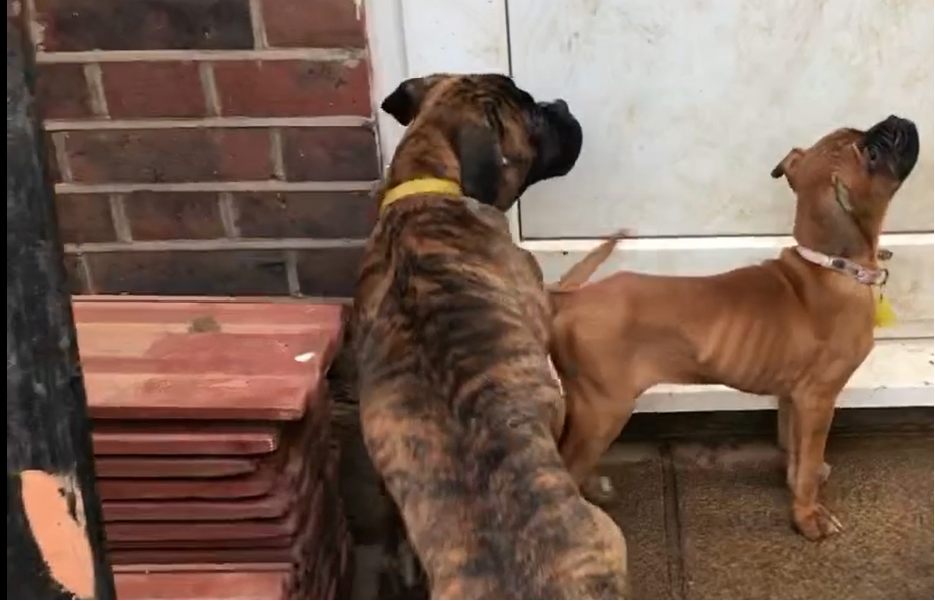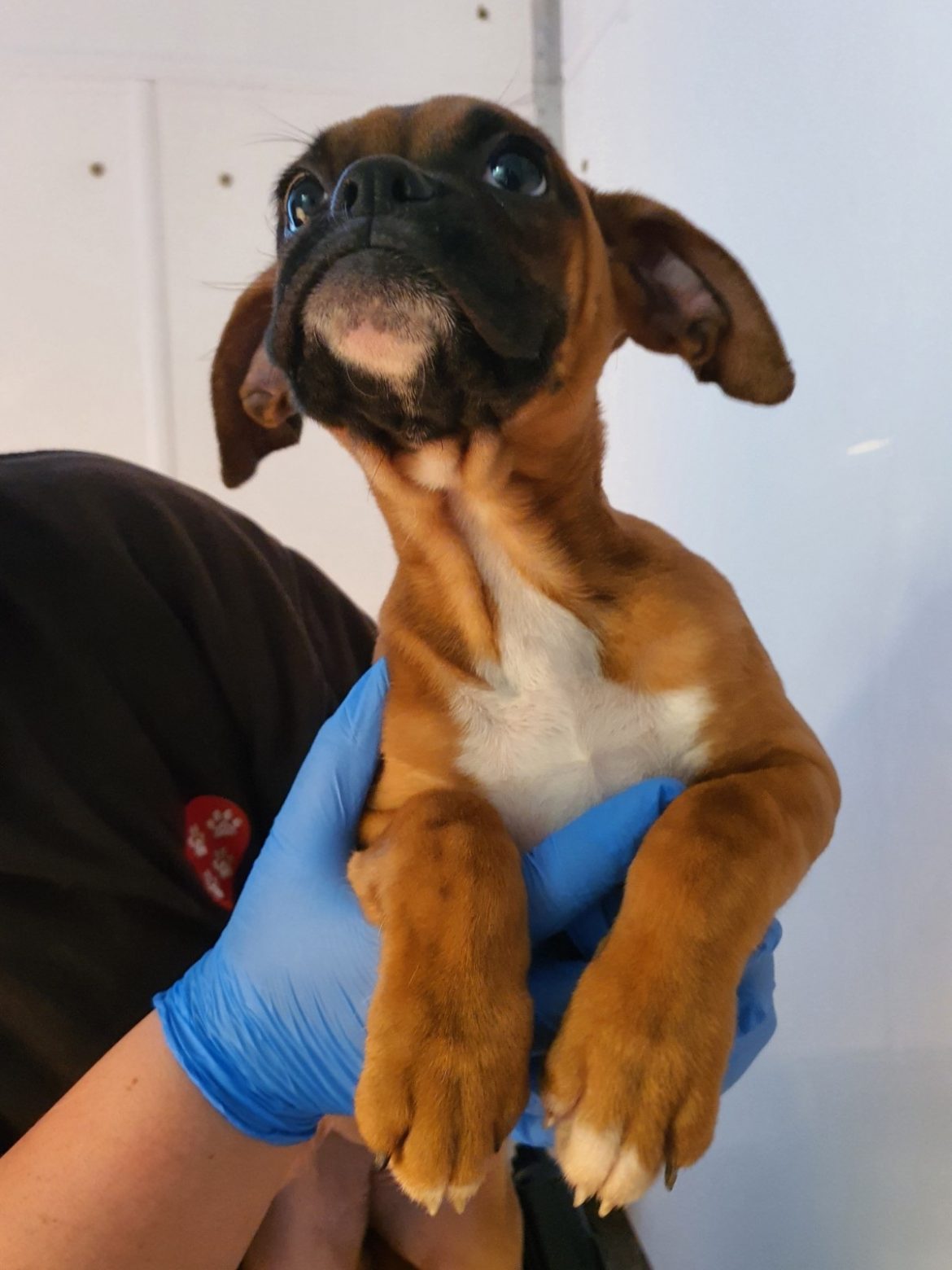Five years ago, a dog called Pudding was rescued from a house in Kingston. Now, she has been given a new lease of life.
As the Dogs Trust’s Head of Operations for the South East, Pudding’s was a case Adam Levy was close to. So, when Pudding needed to be fostered, Levy took her under his wing.
“I took her in. That was my fatal flaw because I just fell in love,” he said. “Boxers are a breed that I’ve always loved and grown up with.”
After about a year, the court allowed Pudding to be rehomed. Levy decided to adopt her.
“By that time, we very much wanted to keep her,” he said.
In May 2020, officers from Kingston Council and animal welfare inspectors from the City of London Corporation investigated a house in Kingston Vale.
In the garden, they found dead, neglected and suffering animals, including pigs, dogs and poultry.
Over 80 animals were seized and taken into the care of Kingston Council. Among them was Pudding.
She had likely been imported illegally from Europe using fake documents to be sold on social media.
When she was rescued, she was just eight weeks old, less than the legal minimum age of 15 weeks required to bring puppies into the UK.
The Dogs Trust were brought in to rehome the 23 dogs and pups, while the birds and pigs were resettled on city farms.

Like many illegally imported dogs, Pudding has suffered a range of health problems.
Levy said: “Unfortunately, for the first 18 months after I got her, she was down at the vet’s what felt like every other week.”
Pudding struggled to put on weight and had to be put on a specific diet due to gastrointestinal problems.
“She was really quite poorly during that period,” he added. “She got pneumonia twice and had to be hospitalised, and she had this horrible cough she just couldn’t get rid of.”
Thankfully, Pudding recovered. However, a heart condition continues to trouble her.
“She’s very different from the dog she was,” said Levy. “Her heart is OK at the moment, but it will eventually deteriorate. It will impact her length of life and her activity levels.”
Levy explained that many are not aware of what they are taking on when they get a dog that has been illegally imported.
“There are no concerns about responsible breeding,” he said. “It’s about making as much money as they can.
“Dogs are bred within an inch of their lives. Lots of these diseases are passed down to the litters, and they come into this country with all manners of health problems.”
Along with poor health, behavioural issues are common with dogs from irresponsible breeders.
“There’s no care for socialising the dogs with the outside world until the day they’re put in the back of a van, transported halfway across Europe, and sold to people at their destinations,” added Levy.

Demand for puppies spiked during the Covid pandemic, driving illegal importers to bring more dogs like Pudding into the country.
“They were coming in in such high numbers. It was incredible,” said Levy. “Because there are such vast profits that can be made and actually very little risk for the people doing it.”
Levy explained that importers constantly change their tactics to avoid being detected at the border.
He added: “Even if a pup is intercepted, provided the person doing the illegal import is willing to pay the quarantine fees, they can even get the dogs back.”
How to avoid irresponsible breeders:
Irresponsible breeders will try to ‘petfish’ customers by pretending that a puppy comes from a happy and healthy home, often using fake personas on social media.
The Dogs Trust offers advice, such as doing research on the breeder and asking specific questions about the pups’ diet and socialisation.
“Historically, we said make sure you see the pups with their mum,” said Levy. “But unfortunately, as part of the trade, they’re bringing more and more pregnant dogs over and giving birth in this country.”
Registered breeders are required to display a licence on the premises. Although, to be safe, the Dogs Trust recommends looking at the Kennel Club’s Assured Breeders list.
“Never make an impulse purchase on your first trip,” Levy added. “Always ask to come back at a later date. Any responsible breeder won’t have an issue with that.”
Finally, Levy advised to always be willing to walk away.
“People lose all sense of rationality when they see pups. Unfortunately, the desire for a specific breed will overwhelm their concern,” he said.
“Don’t feel like you’re removing the pup from a horrible situation,” Levy added. “The people selling these pups don’t care. As long as you’ve got the money for them, they don’t care who they sell to.”
Giving a dog a second chance at life
During the pandemic, the UK’s dog population increased by 2m. Since then, the number of handover requests received by the Dogs Trust has doubled, surpassing 45,000 in 2023.
“We are categorically in the midst of a relinquishment crisis,” said Levy. “Perfectly rehomable dogs are having to be put to sleep every week just because we don’t have enough space to accommodate the dogs that are being giving up.”
Despite the setbacks, Levy maintained that taking care of Pudding has been rewarding and urged anyone thinking about buying a dog to consider adoption.
“The amount you get back from giving them a second chance is really something,” he said.
“I would always recommend in the first instance to go along to your local rescue organisation or have a conversation at one of the Dogs Trust centres across the land,” he added. “It’s amazing the variety of breeds that we get in. Quite often we can find the dog just right for you.”






